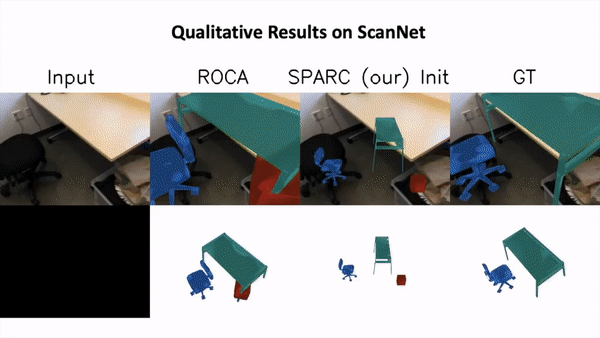
Rethinking Inductive Biases for Surface Normal Estimation
(CVPR 2024) - Oral (top 0.8%)
Gwangbin Bae, Andrew J. Davison
In this paper, we discuss the inductive biases needed for surface normal estimation and propose to (1) utilize the per-pixel ray direction and (2) estimate the surface normals by learning the relative rotation between nearby pixels.

SuperPrimitive: Scene Reconstruction at a Primitive Level
(CVPR 2024)
Kirill Mazur, Gwangbin Bae, Andrew J. Davison
Should the complexity of 3D reconstruction tasks be dependent on # of pixels or # of “things” in the image? We use surface normal and segmentation priors to split the image into 2.5D segments and show how this representation can help tackle a wide range of 3D reconstruction tasks

FOUND: Foot Optimization with Uncertain Normals for Surface Deformation Using Synthetic Data
(WACV 2024)
Oliver Boyne, Gwangbin Bae, James Charles, Roberto Cipolla
Monocular surface normals and their uncertainty can be used to fit a generative 3D model. We demonstrate this for the case of the human foot, which can be useful for commercial applications like virtual shoe try-on.

DigiFace-1M: 1 Million Digital Face Images for Face Recognition
(WACV 2023)
Gwangbin Bae, Martin de La Gorce, Tadas Baltrušaitis, Charlie Hewitt, Dong Chen, Julien Valentin, Roberto Cipolla, Jingjing Shen
In this paper, we introduce a new large-scale synthetic dataset for face recognition. Unlike the existing datasets consisting of millions of real face images, our dataset is free of privacy violations and labelling noise.

IronDepth: Iterative Refinement of Single-View Depth Using Surface Normal and its Uncertainty
(BMVC 2022)
Gwangbin Bae, Ignas Budvytis, Roberto Cipolla
We use surface normal to propagate depth between pixels and formulate depth refinement/upsampling as classification of choosing the neighbouring pixel to propagate from.

SPARC: Sparse Render-and-Compare for CAD Model Alignment in a Single RGB Image
(BMVC 2022)
Florian Langer, Gwangbin Bae, Ignas Budvytis, Roberto Cipolla
SPARC aligns CAD models to the objects in the image by iteratively updating their 9DoF pose. This is done by rendering sparse points from the CAD model and comparing their depth/normal to the depth/normal estimated from the image.

Multi-View Depth Estimation by Fusing Single-View Depth Probability with Multi-View Geometry
(CVPR 2022) - Oral (top 4.2%)
Gwangbin Bae, Ignas Budvytis, Roberto Cipolla
In this paper, we propose MaGNet, a novel framework for fusing single-view depth probability with multi-view geometry, to improve the accuracy, robustness and efficiency of multi-view depth estimation.

Estimating and Exploiting the Aleatoric Uncertainty in Surface Normal Estimation
(ICCV 2021) - Oral (top 3.4%)
Gwangbin Bae, Ignas Budvytis, Roberto Cipolla
In this paper, we estimate and evaluate the aleatoric uncertainty in CNN-based surface normal estimation, for the first time in literature. We also introduce a novel decoder framework where pixel-wise MLPs are trained on a subset of pixels selected based on the estimated uncertainty.

Deep Multi-View Stereo for Dense 3D Reconstruction from Monocular Endoscopic Video
(MICCAI 2020) - Accepted without rebuttal
Gwangbin Bae, Ignas Budvytis, Chung-Kwong Yeung, Roberto Cipolla
In this paper, we introduce a deep-learning-based multi-view stereo pipeline that can estimate dense and accurate 3D reconstruction from a sequence of monocular endoscopic images.

Approximate Depth Estimation in Colonoscopy Images
(MPhil Thesis, 2019)
Gwangbin Bae
The ability to estimate depth can improve the accuracy and safety of colonoscopy procedures. In this project, we introduce a self-supervised approach where Structure-from-Motion is used to recover sparse ground truth depth up to an arbitrary scale, and the network is trained with a scale-invariant loss.

